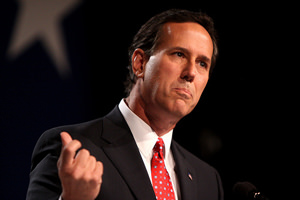Rick Santorum’s Family Provocation
Lost in the hubbub over Herman Cain's love affair with the number 9 during last week's Republican debate were some compelling observations by Rick Santorum about "the breakdown of the American family" and its relationship to poverty.
Lost in the hubbub over Herman Cain’s love affair with the number 9 during last week’s Republican debate were some compelling observations by Rick Santorum about “the breakdown of the American family” and its relationship to poverty. His comments deserved more attention than a wacky tax plan or Newt Gingrich’s proposal to jail two Democratic foes.
“You want to look at the poverty rate among families that have … a husband and wife working in them?” Santorum asked. “It’s 5 percent today. A family that’s headed by one person? It’s 30 percent today. We need to do something.”
Noting that “the word ‘home’ in Greek is the basis of the word ‘economy,'” the former Pennsylvania senator argued for “a policy that supports families, that encourages marriage, that has fathers take responsibility for their children.” He added: “You can’t have a wealthy society if the family breaks down.”
Santorum is broadly right. According to Columbia University’s National Center for Children in Poverty, in the 2005-09 period, 5 percent of married family households were poor at some point within a given year, compared with 28.8 percent of single-parent households. For 2010, the figures were 8.4 percent and 39.6 percent.
Interestingly, one politician who agrees with Santorum is named Barack Obama. “We know that children who grow up without a father are more likely to live in poverty,” the president said at a Father’s Day event last year. “They’re more likely to drop out of school. They’re more likely to wind up in prison. They’re more likely to abuse drugs and alcohol…. They’re more likely to become teenage parents themselves.” Growing up without a father, he added, “leaves a hole in a child’s life that no government can fill.”
Before we ask what is to be done, what we shouldn’t do is blame gays and lesbians for disrupting the heterosexual family. We straight people have done a fine job of this all by ourselves.
Santorum takes a somewhat different view. He has argued that if same-sex marriage becomes the norm, “marriage then becomes, to some degree, meaningless.” This I don’t understand. Neither my marriage nor Santorum’s is rendered “meaningless” because a gay or lesbian couple decides to make a lifelong commitment.
On the contrary. Jonathan Rauch, a friend and one of the ablest champions of gay marriage, has argued that the demand for gay marriage could be seen as a conservative turn within the gay community, involving as it did a “communitarian and family-minded” emphasis on “civic responsibilities.”
Beyond the gay marriage battle, we need a bargain: Liberals should acknowledge, as Obama has, that strengthening the family is vital to economic justice. Conservatives should acknowledge that economic justice is vital to strengthening families.
For example: Our national policies on sick leave and family leave are among the most anti-family in the developed world. When faced with a choice between the needs of the family and the needs of employers, we nearly always tilt toward employers. Western European nations, influenced by both pro-family Christian Democrats and pro-labor Social Democrats, have done far more to make work compatible with family life.
Conservatives often say that tax policies should be more helpful to families raising children. I agree. But this can’t be yet another excuse for cutting taxes on the wealthy. New tax benefits for families with kids have to be concentrated on those in the middle and the bottom of the income structure, where modest amounts additional relief could go a long way.
The impact of the single-parent family on the well-being of children has sometimes been an explosive matter because it is often discussed in relation to the African-American community. Obama himself has made this explicit link. And young black men do face a crisis. Rather than avoid the issue (a temptation for liberals) or pretend that public policy can do little about it (a temptation for conservatives), we need to make their plight a high national priority. Scholars such as Harry Holzer and Peter Edelman have suggested a variety of work and education policies that could improve the economic situation of young men who are poor. This, in turn, could enhance the chances of family formation, which has been deteriorating among poorer whites as well.
It does not demean the heroic work of dedicated single mothers to say that two-parent families have a better shot at prosperity. So I’m glad Santorum brought up the issue. But let’s focus on practical ways to make the family stronger. Using pro-family slogans to divide us against each other won’t do much for any sort of family.
E.J. Dionne’s email address is ejdionne(at)washpost.com.
© 2011, Washington Post Writers Group
Your support matters…Independent journalism is under threat and overshadowed by heavily funded mainstream media.
You can help level the playing field. Become a member.
Your tax-deductible contribution keeps us digging beneath the headlines to give you thought-provoking, investigative reporting and analysis that unearths what's really happening- without compromise.
Give today to support our courageous, independent journalists.









You need to be a supporter to comment.
There are currently no responses to this article.
Be the first to respond.